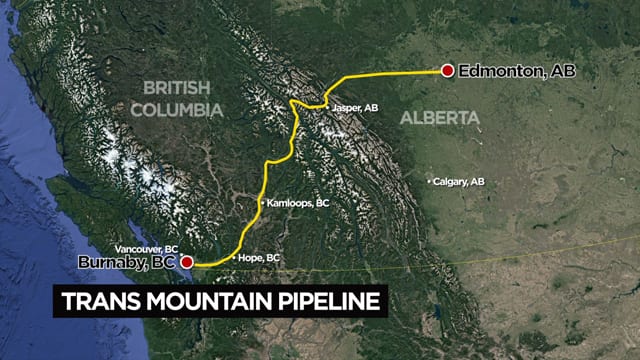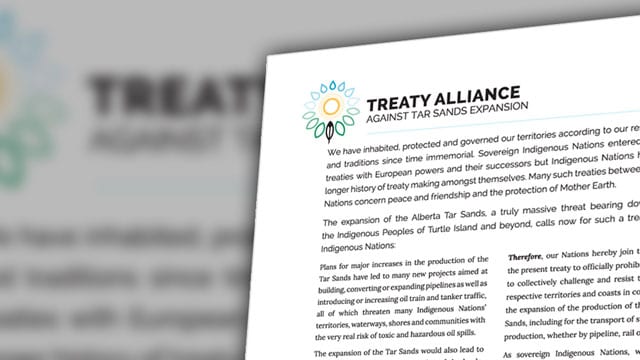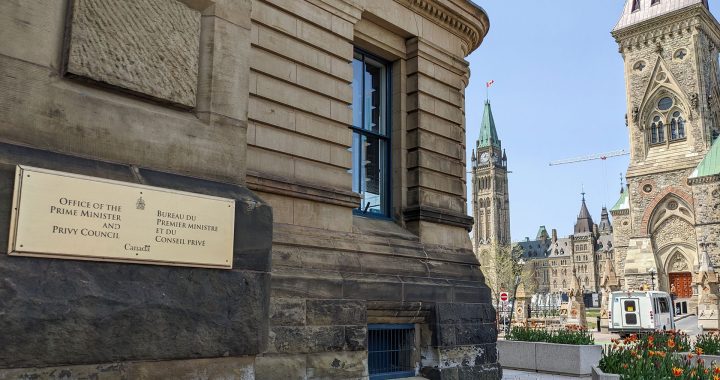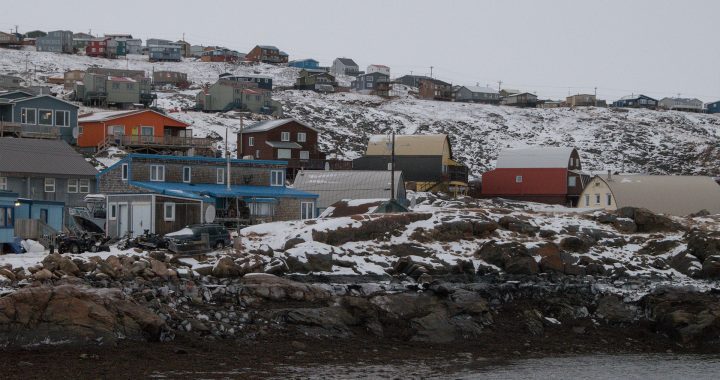
Justin BrakeAPTN NewsAn organization backed by a prominent climate scientist is challenging the Trans Mountain expansion project on the grounds the National Energy Board (NEB) must consider the pipeline’s impacts on climate change.On Monday representatives of environmental group Stand.earth announced they had filed a motion with the NEB to “expand its scope of review to include all upstream and downstream climate impacts for the project,” according to a news release posted on the organization’s website.At a news conference in Vancouver Monday, Kirsten Zickfeld, a climate scientist at Simon Fraser University and a lead author of the International Panel of Climate Change’s (IPCC) recent report on limiting global warming to 1.5 degrees centigrade, said the science “shows very clearly that new fossil fuel infrastructure—such as the trans Mountain expansion—is not consistent with limiting warming to 1.5 degrees and avoiding the worst impacts of climate change.”The IPCC report, released last fall, said in order to limit warming to 1.5 degrees centigrade, global carbon dioxide emissions would have to be reduced by almost half below 2010 levels within 12 years, and reach net zero by 2050.The call to give greater consideration to climate change in the NEB’s renewed review of Trans Mountain is one of several legal issues the project faces.Last August the Federal Court of Appeal quashed the NEB’s 2016 approval of the project, saying it neglected to consider the impacts of increased tanker traffic on resident killer whales, and that “Canada failed to fulfil the duty to consult owed to Indigenous peoples.”Stand.earth’s motion is part of the renewed NEB process currently under way to address the outstanding issues.A spokesperson for the NEB told APTN News Tuesday the board “has received the motion,” and that once it is reviewed “the board will issue further direction to the parties in the reconsideration process.”Casey Leggett, legal counsel for Stand.earth, said they are asking the NEB to do the same thing the board did with its review of the Energy East pipeline.In August 2017 the NEB decided to expand its review of that pipeline—which was slated to carry oil from Alberta to New Brunswick before being killed by the federal government—to include the upstream and downstream impacts of climate change.“It would be arbitrary and unreasonable—and in fact unprincipled—not to take the same stance with respect to the Trans Mountain expansion project,” Leggett said.Stand.earth’s International Program Director Tzeporah Berman said the organization asked the NEB in 2014 to do an assessment of the Trans Mountain’s impact on climate change — but the Board rejected that motion “on the basis that the National Energy Board Act of 2012, which was passed by the Harper government, [allowed] them to limit the scope of pipeline reviews, to not consider climate change.”Berman said the Liberals’ election in 2015 was based in part on Trudeau’s promise to reform the NEB and environmental assessment laws, and to take action on climate change.In November 2016 the government’s Ministerial Panel for the Trans Mountain Project released its final report, which concluded with six “high-level questions…that we commend to the Government of Canada for serious consideration — if not resolution — as it considers the potential future of this project,” the report reads.The first question asks: “Can construction of a new Trans Mountain Pipeline be reconciled with Canada’s climate change commitments?”Berman said that and the other questions “were never answered.”At an internal meeting in Vancouver days before that report was released, public servants said they had been instructed by the Liberal government to “give cabinet a legally-sound basis for saying ‘yes’” to the project, the National Observer reported last year.The revelations suggested the Trudeau government may have already made up its mind about the project prior to the ministerial panel’s report and amid ongoing consultations with Indigenous communities.APTN asked federal Environment and Climate Change Minister Catherine McKenna to respond to the claim that expanding the Trans Mountain pipeline—from a current output of 300,000 barrels of diluted bitumen per day from Alberta’s oil sands to 890,000 barrels—is inconsistent with limiting global warming to 1.5 degrees.We did not receive a response by the time of publication.Before attending the U.N. climate summit in Poland last month Dënesųłiné Elder and former chief François Paulette told APTN climate change is disproportionately impacting Indigenous peoples, and that the world must put an end to fossil fuel extraction.“There are so many ways of how to transform energy other than fossil fuel,” he said, adding the oil and gas industry is the “biggest threat to the survival of Mother Earth.”In the fall of 2016, more than 130 First Nations entered into treaty to stop Trans Mountain and other fossil fuel projects associated with Alberta’s oil sands. Mohawk Council of Kanehsatà:ke Grand Chief Serge Simon has spoken publicly as a member of the Treaty Alliance Against Tar Sands Expansion but could not be reached for comment Tuesday.During a press conference at the Assembly of First Nations’ (AFN) Special Chiefs’ Assembly in Ottawa last month Simon reiterated his own opposition to Trans Mountain on the grounds of climate change.“The planet is in deep trouble. Everyone recognizes it except the governments, those who are supporting this industry,” he said.“The transition must be done and it must be done soon if we’re going to save our grandchildren’s future.”Simon took aim at the Trudeau government’s purchase of Trans Mountain last summer, noting the $4.5 billion of public money spent on the embattled project “could have [been] used to help us find a solution.”Last month the Liberals also announced $1.6 billion in financial aid to the oil and gas industry.Andrea Bastien of Indigenous Climate Action said discussions around Trans Mountain are not seeking the consent of the youth, or considering the impacts of climate change on future generations.“We’re in this pivotal moment where we can be on the right side of history. We need to leave a legacy that will allow for life to flourish again and not take away from what is going on,” she said at the AFN press conference last month.Last week a coalition of more than 130 First Nations met near Calgary to explore purchasing a majority share in the project from the federal government, which has said it does not want to be a long-term owner of Trans Mountain.Stephen Buffalo, president and CEO of the Indian Resource Council (IRC), said the project represented “an opportunity to find ways that some of our communities can get out of poverty.”The IRC said most of its members want to buy the pipeline and make it 100 per cent Indigenous-owned-and-operated, while bringing in jobs and economic opportunity for their communities.Bastien said any short-term gains from fossil fuel development are outweighed by the grim prospects of a climate that warms beyond 1.5 degrees.“We need to be looking at renewable, sustainable ways of being. And it’s completely possible,” she said.“We have this beautiful moment to get that right. We don’t need young people talking about how they don’t see a future for themselves in this world.”The NEB must make a decision on the motion, complete its work and submit a final report to cabinet by Feb. 22.“If the NEB is to have any credibility in this country moving forward then now is the time to ensure full transparency and analysis of these critical issues…consistent with our federal government’s commitment on climate change,” said Berman.With files from Tamara Pimentel.
Mohawk Council of Kanehsatà:ke Grand Chief Serge Simon has spoken publicly as a member of the Treaty Alliance Against Tar Sands Expansion but could not be reached for comment Tuesday.During a press conference at the Assembly of First Nations’ (AFN) Special Chiefs’ Assembly in Ottawa last month Simon reiterated his own opposition to Trans Mountain on the grounds of climate change.“The planet is in deep trouble. Everyone recognizes it except the governments, those who are supporting this industry,” he said.“The transition must be done and it must be done soon if we’re going to save our grandchildren’s future.”Simon took aim at the Trudeau government’s purchase of Trans Mountain last summer, noting the $4.5 billion of public money spent on the embattled project “could have [been] used to help us find a solution.”Last month the Liberals also announced $1.6 billion in financial aid to the oil and gas industry.Andrea Bastien of Indigenous Climate Action said discussions around Trans Mountain are not seeking the consent of the youth, or considering the impacts of climate change on future generations.“We’re in this pivotal moment where we can be on the right side of history. We need to leave a legacy that will allow for life to flourish again and not take away from what is going on,” she said at the AFN press conference last month.Last week a coalition of more than 130 First Nations met near Calgary to explore purchasing a majority share in the project from the federal government, which has said it does not want to be a long-term owner of Trans Mountain.Stephen Buffalo, president and CEO of the Indian Resource Council (IRC), said the project represented “an opportunity to find ways that some of our communities can get out of poverty.”The IRC said most of its members want to buy the pipeline and make it 100 per cent Indigenous-owned-and-operated, while bringing in jobs and economic opportunity for their communities.Bastien said any short-term gains from fossil fuel development are outweighed by the grim prospects of a climate that warms beyond 1.5 degrees.“We need to be looking at renewable, sustainable ways of being. And it’s completely possible,” she said.“We have this beautiful moment to get that right. We don’t need young people talking about how they don’t see a future for themselves in this world.”The NEB must make a decision on the motion, complete its work and submit a final report to cabinet by Feb. 22.“If the NEB is to have any credibility in this country moving forward then now is the time to ensure full transparency and analysis of these critical issues…consistent with our federal government’s commitment on climate change,” said Berman.With files from Tamara Pimentel.










Elected chiefs are merely protesters with no legal authority to make decisions re: piplines, railways etc. and they don’t seem to understand should they remain as p.o.w.’s they as well are responsible for the destruction of earth….Elected chiefs are simply chief executive officers of a corporate charter “belonging to Corporate Canada….Hereditary Chiefs are also p.o.w.’s because of the indian affairs registration number….if that helps you any….
Elected chiefs are merely protesters with no legal authority to make decisions re: piplines, railways etc. and they don’t seem to understand should they remain as p.o.w.’s they as well are responsible for the destruction of earth….Elected chiefs are simply chief executive officers of a corporate charter “belonging to Corporate Canada….Hereditary Chiefs are also p.o.w.’s because of the indian affairs registration number….if that helps you any….
How about saying backed by U S groups with their own agenda, which is not the good of Canada.
How about saying backed by U S groups with their own agenda, which is not the good of Canada.